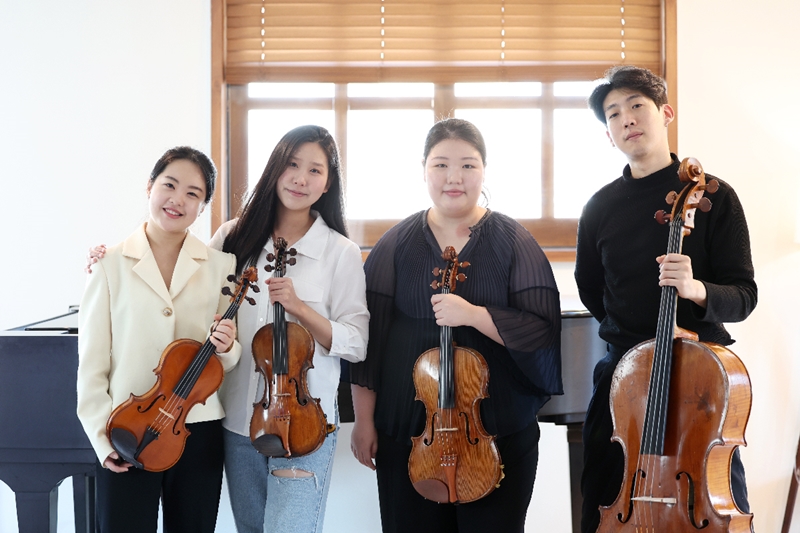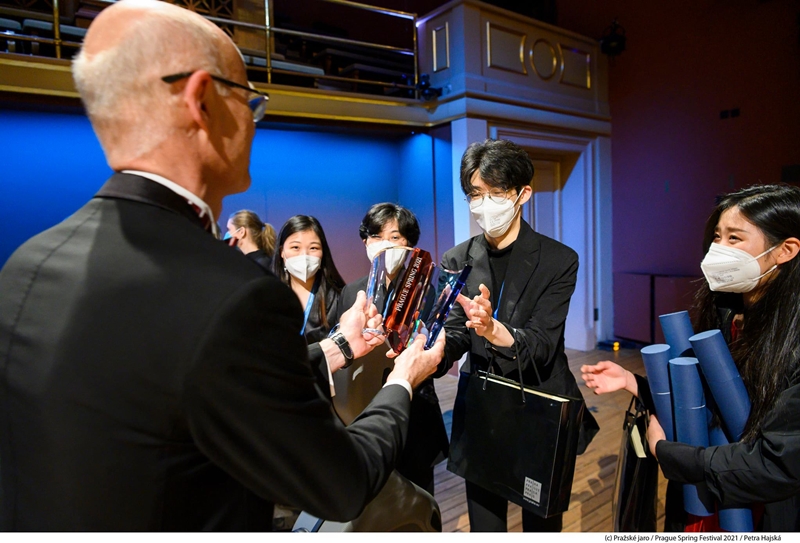By Lee Kyoung Mi with contribution from Son Yerhin
Video = Kim Sunjoo, Lee Jun Young
Seoul
"Let's play from the 117th bar again."
"Playing like this is so boring...Let's play the last part at this tempo.
"The pitch keeps rising. Do it again?"
Korea.net on April 19 interviewed the quartet at a rehearsal venue in Seoul's Seocho-gu District. Arete impressed while practicing without resting as Korea.net staff set up cameras and equipment.
Formed in 2019, the quartet comprises Jeon Chaeann (first violin), Son Jieun (second violin and guest member), Jang Yoonsun (viola) and Park Seonghyeon (cello). Before they teamed up, their interest in chamber music led them to form a string ensemble and study music together. At an afterparty after performing in a chamber orchestra in Japan, they seriously discussed their future and agreed to form the quartet at Park's suggestion.
Less than four years after working together, the quartet has gained global recognition. At the International Mozart Competition in February in Salzburg, Austria, Arete won the string quartet category and top prize for best interpretation of a Mozart string quartet. At last year's ARD International Music Competition Munich in Germany, the group claimed the Special Prize ProQuartet.
In May 2021, the group became Korea's first to win first prize in the string quartet category of the Prague Spring International Music Competition in the Czech Republic with five special prizes. This was the first global contest Arete competed in and it won the top prize with no runner-up.
The four study chamber music at the University of Music and Performing Arts Munich as well as perform together.

Arete Quartet on April 19 performed String Quartet No. 4 by composer Yun Isang during the Korea.net interview. They chose the piece for being "full of Korean elements in feel and rhythm that Korea.net readers will find interesting." From left are Son Jieun (second violin and guest member), Jeon Chaeann (first violin), Jang Yoonsun (viola) and Park Seonghyeon (cello). (Kim Sunjoo)
On the secret behind the group's success, Park said, "We have no secret but strive not to lose our direction and practice constantly," adding, "We believe ability is important but that is luck is equally so."
The four gather every morning unless they have other plans and split every evening. They have the same daily routine even before a competition or concert because despite each member earning prestigious awards, individual talent alone is insufficient when forming a quartet.
The group says that as a quartet, member need a lot of dialogue and discussion, though this is similar to other music groups. Members call this hard existence "quartet life," which requires endless conversations and practice of their music.
"What's most important is to understand your role and play. Otherwise, neither individual nor group practice will mean anything," Park said. "I think understanding your role helps you understand the song, which affects the quality of the work. So when we get together, we try to talk as much as we practice."

Members of Arete Quartet in May 2021 receive their trophy after winning first prize in the string quartet category at the Prague Spring International Music Competition in the Czech Republic. (Prague Spring International Music Competition)
Young Korean classical musicians other than Arete are earning fame worldwide including pianist Lim Yunchan, winner of the Van Cliburn International Piano Competition in the U.S.; violinist Yang In Mo, who claimed the International Jean Sibelius Violin Competition in Finland; and cellist Choi Ha-young, who won the Queen Elisabeth International Music Competition in Belgium.
Thus the phrase "heyday of K-Classical music" has appeared.
On the term "K-Classical music," the four said they find it interesting and amazing when the letter "K" for Korea is inserted in the term "classical music," which is originally from Europe. Park said Korea has many talented and exceptional musicians and expressed hope that public interest, not just wins at competitions, will spur a greater response.
The German writer Johann Wolfgang Von Goethe called a string quartet "a dialogue among four intellectuals."
Arete said it is committed to continuing such dialogue without stopping. "We hope to show our music on more stages and to audiences in more countries," Jeon said.
km137426@korea.kr